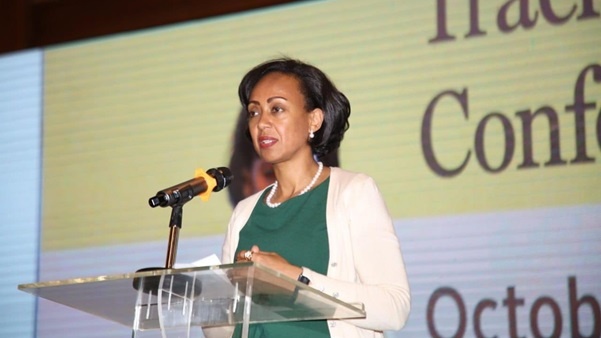
Lia Tadesse Gebremedhin was sworn in as Ethiopia’s Minister of Health on March 12, 2020—the day after the World Health Organization (WHO) declared COVID-19 a pandemic. That night, Ethiopia detected its first case of the virus.
“It was a very difficult time,” Lia* said. Ethiopia, like many countries in Africa, was both well-positioned and unprepared to respond to COVID-19. In the years prior, the country had invested heavily in its primary health care system and, because of the Ebola epidemic in West Africa, its public health emergency response structures. But intensive care units across Ethiopia—and across the continent—were short on essential resources such as oxygen, personal protective equipment, and staff trained in critical care.
Lia is quick to add that COVID wasn’t the only difficulty she and her country faced during her four-year tenure as Minister. Civil conflicts and the ongoing impacts of climate change, including droughts, were displacing people, damaging health facilities, and causing additional infectious outbreaks across Ethiopia.
“We were responding to all of these issues at the same time, having to constantly adjust and be agile to try to mitigate the pandemic and make sure there was continuity of essential health care services,” Lia said. “And we were trying to continue to improve and build the health system as well.”
The challenge of balancing immediate public health needs with long-term vision is one that “all leaders face today—especially in countries with fewer resources,” Lia said. And it’s one that will remain on the forefront of her mind as she takes on her new role as executive director of the Harvard Ministerial Leadership Program. Lia succeeds Michael Sinclair, who will stay on as a special advisor through the end of the year.
Sharing lessons, building camaraderie
Launched in 2012, the Ministerial Program is a joint initiative of Harvard T.H. Chan School of Public Health, Harvard Kennedy School, and Harvard Graduate School of Education, in collaboration with Big Win Philanthropy. It provides support to health, finance, education, and other ministers from Africa, Southeast Asia, and Latin America who focus on advancing human development. Participants attend one of the annual Harvard Ministerial Forums, in-person intensive workshops focused on leadership and political strategy, priority setting, budgeting and system building, cross-sectoral collaboration, and policy implementation.
Thereafter, ministers have access to a menu of technical support options, including continuing education, virtual mentoring, policy research support, and data tracking tools. They also enjoy the camaraderie and support of their fellow participants, as well as program alumni. To date, 262 ministers from 66 countries have participated in the program.
Continue reading this story on Harvard T.H. Chan School of Public Health
* Ethiopians use patronymic names rather than family names. That is, a person in Ethiopia is addressed by his/her given name as there is no such thing as ‘family name’ or ‘inherited name.’
